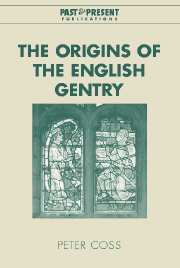Book contents
- Frontmatter
- Contents
- List of illustrations
- Preface
- 1 The formation of the English gentry
- 2 The roots of the English gentry
- 3 The Angevin legacy: knights as jurors and as agents of the state in the reign of Henry III
- 4 The crisis of the knightly class revisited
- 5 Knights in politics: minor landowners and the state in the reign of Henry III
- 6 Knighthood, justice and the early Edwardian polity
- 7 The explosion of commissions and its consequences
- 8 Identity and the gentry
- 9 Knights, esquires and the origins of social gradation in England
- 10 Crystallisation: the emergence of the gentry
- Appendices
- Bibliography
- Index
- Past and Present Publications
3 - The Angevin legacy: knights as jurors and as agents of the state in the reign of Henry III
Published online by Cambridge University Press: 10 December 2009
- Frontmatter
- Contents
- List of illustrations
- Preface
- 1 The formation of the English gentry
- 2 The roots of the English gentry
- 3 The Angevin legacy: knights as jurors and as agents of the state in the reign of Henry III
- 4 The crisis of the knightly class revisited
- 5 Knights in politics: minor landowners and the state in the reign of Henry III
- 6 Knighthood, justice and the early Edwardian polity
- 7 The explosion of commissions and its consequences
- 8 Identity and the gentry
- 9 Knights, esquires and the origins of social gradation in England
- 10 Crystallisation: the emergence of the gentry
- Appendices
- Bibliography
- Index
- Past and Present Publications
Summary
It is one thing to see the Angevin polity as the seed-bed out of which the English gentry was to grow. It is quite another to regard the gentry as already formed in Angevin England. Why some historians should do so has much to do with the existence of a knightly class. Knights, after all, were later to form the highest gradation within the gentry. However, it is not so much knighthood itself which is held to be significant in this context, but the tasks which Angevin and post-Angevin knights were called upon to perform, both within the judicial system and within local administration. This, for example, is where Hugh Thomas, a major recent proponent of an Angevin gentry, lays his greatest stress. I will argue in this chapter, however, that two distinct phenomena have been confused. There was a major difference between participating in judicial procedures – which was expected of a knight as a matter of course – and the employment of a much smaller body of selected landowners and others as trusted agents of the state. The confounding of the two has much to do with the idea of self-government at the king's command, the notion that English kings, and the Angevins in particular, called forth the people to govern themselves on the king's behalf. This idea, although in essence much older, was popularised by A.B. White in 1933. It may be said to have influenced unduly the study of the gentry ever since.
- Type
- Chapter
- Information
- The Origins of the English Gentry , pp. 44 - 68Publisher: Cambridge University PressPrint publication year: 2003

